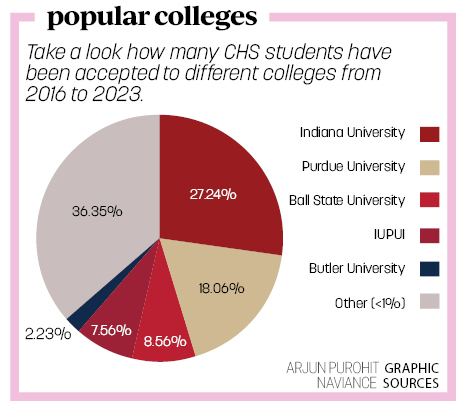
National College decision day is on May 1. At this point, most schools require students to pick which school they plan to attend. For senior Sarah Dawood, in order to decide on which college to go to, she said she looks at a variety of factors. She said one of these factors is cost.
“First, I start off by looking at how strong the programs are. Personally I am planning to major in legal studies and minor in psychology, so I look at those programs especially when looking at which college to attend,” she said. “However, the biggest factor I look at is money and the financial aspect. I look at what scholarships are available and what the total tuition costs are.”
Senior Jasmine Hickman said she agreed that the financial aspect of college is a big factor in her decision to attend.
“Financial aid and scholarship calculation are a big one, I’m trying to go to grad school in four years so I don’t want to stretch my pockets too thin for undergrad,” Hickman said. “I usually look at a combination of price, strength of the programs, student body and campus environment.”
Dawood said the schools she applied to offer many resources to assist students in deciding if they want to go there or not.
“A lot of schools have financial aid offices and people you can talk to gather more information about the school and it can be really helpful in deciding whether or not you want to go there,” Dawood said.
Melinda Stephen, college and career resource and programming coordinator, said there are many different ways seniors can go through and decide which college will be the best fit for them.
“Seniors will almost need to circle back through the application process again,” she said. Hopefully, students went through and did some research about why the schools they applied to are good for them. For example, is the school in a city, or a college town, what’s the environment like and how strong are the programs? These are all things that seniors should have gone through when deciding where to apply and now they can circle back through that to decide where to go after they have been accepted into the schools,” Stephen said. “You should also go visit a school again even if you have already visited it before. This time you would be looking at it through a different lens, rather than a prospective student, you are an accepted student now. Now you can look at the college differently.”
Senior Mikyle Khan said he also has his own methods for narrowing down what school to go to.
“I think what people should do is to be sure to talk to their friends and family about it. They will give you the most honest feedback about where you want to go and also may express concerns that you may not have even thought about,” Khan said. “Another thing I do is look at what I want to major in and look at the college rank nationally. I do this because it tells me if I am getting my money’s worth and if I would be getting a good education for my career pathway.”
Hickman said there are many resources at CHS to help students decide what college they want to go to.
“Naviance has a college search that has a bunch of different factors that you can say you want/need in looking for a college. This is super helpful when looking at and comparing different schools you want to go to,” Hickman said.
Stephan said she agreed with this.
“So in early March, we offer a program in the evening for students and parents called Finalizing Financial Aid, where we bring in financial aid experts and they help students and parents work through all of that information,” she said.
According to Stephan, these experts provide a cost comparison sheet that is incredibly helpful to students.
“The biggest thing that I think you can do to help yourself decide where you want to go is to do your research. If you can not find anything, call the school. Be informed so that you can make an informed decision. Even talk to a friend who is currently attending that school and talk to them about the environment of the school and all the other things you are looking for in a school.” Dawood said.




























![Keep the New Gloves: Fighter Safety Is Non-Negotiable [opinion]](https://hilite.org/wp-content/uploads/2024/12/ufcglovescolumncover-1200x471.png)
















































![Review: “We Live in Time” leaves you wanting more [MUSE]](https://hilite.org/wp-content/uploads/2024/12/IMG_6358.jpg)
![Review: The premise of "Culinary Class Wars" is refreshingly unique and deserving of more attention [MUSE]](https://hilite.org/wp-content/uploads/2024/12/MUSE-class-wars-cover-2.png)
![Introducing: "The Muses Who Stole Christmas," a collection of reviews for you to follow through winter [MUSE]](https://hilite.org/wp-content/uploads/2024/12/winter-muse-4.gif)
![Review: "Meet Me Next Christmas" is a cheesy and predictable watch, but it was worth every minute [MUSE]](https://hilite.org/wp-content/uploads/2024/11/AAAAQVfRG2gwEuLhXTGm3856HuX2MTNs31Ok7fGgIVCoZbyeugVs1F4DZs-DgP0XadTDrnXHlbQo4DerjRXand9H1JKPM06cENmLl2RsINud2DMqIHzpXFS2n4zOkL3dr5m5i0nIVb3Cu3ataT_W2zGeDAJNd_E-1200x884.jpg)
![Review: "Gilmore Girls", the perfect fall show [MUSE]](https://hilite.org/wp-content/uploads/2024/11/gilmore-girls.png)
![Review in Print: Maripaz Villar brings a delightfully unique style to the world of WEBTOON [MUSE]](https://hilite.org/wp-content/uploads/2023/12/maripazcover-1200x960.jpg)
![Review: “The Sword of Kaigen” is a masterpiece [MUSE]](https://hilite.org/wp-content/uploads/2023/11/Screenshot-2023-11-26-201051.png)
![Review: Gateron Oil Kings, great linear switches, okay price [MUSE]](https://hilite.org/wp-content/uploads/2023/11/Screenshot-2023-11-26-200553.png)
![Review: “A Haunting in Venice” is a significant improvement from other Agatha Christie adaptations [MUSE]](https://hilite.org/wp-content/uploads/2023/11/e7ee2938a6d422669771bce6d8088521.jpg)
![Review: A Thanksgiving story from elementary school, still just as interesting [MUSE]](https://hilite.org/wp-content/uploads/2023/11/Screenshot-2023-11-26-195514-987x1200.png)
![Review: "When I Fly Towards You", cute, uplifting youth drama [MUSE]](https://hilite.org/wp-content/uploads/2023/09/When-I-Fly-Towards-You-Chinese-drama.png)
![Postcards from Muse: Hawaii Travel Diary [MUSE]](https://hilite.org/wp-content/uploads/2023/09/My-project-1-1200x1200.jpg)
![Review: "Ladybug & Cat Noir: The Movie," departure from original show [MUSE]](https://hilite.org/wp-content/uploads/2023/09/Ladybug__Cat_Noir_-_The_Movie_poster.jpg)
![Review in Print: "Hidden Love" is the cute, uplifting drama everyone needs [MUSE]](https://hilite.org/wp-content/uploads/2023/09/hiddenlovecover-e1693597208225-1030x1200.png)
![Review in Print: "Heartstopper" is the heartwarming queer romance we all need [MUSE]](https://hilite.org/wp-content/uploads/2023/08/museheartstoppercover-1200x654.png)



